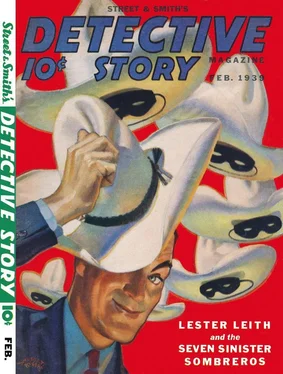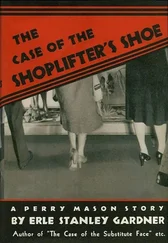“Why, you double-crossing—”
Captain Carmichael placed a stern band on Sergeant Ackley’s shoulder.
“Sergeant,” he said, “you forget yourself.”
“But that was his idea! It was—”
Captain Carmichael interrupted: “Sergeant, you’re quite beside yourself. Apparently you have forgotten that you worked out that idea after pacing the floor for two sleepless nights. In fact, sergeant, I believe I have a statement to that effect in your own handwriting.”
Sergeant Ackley subsided. After a moment, he made one more attempt to assert himself.
“Well,” he blustered, “we’ll drag Lester Leith in here. We’ll take him before the grand jury. We’ll ask him where he got those ninety, one-thousand-dollar bills which he presented to the Orthopedic Hospital. We’ll make him show—”
Captain Carmichael’s laugh was scornful. “I presume, sergeant,” he said, “that you’d go so far as to endeavor to show that those identical one-thousand-dollar bills must have been hijacked from a thief who in turn stole them from a political organization which was planning to undermine our government.”
“Why not?” Ackley asked.
“And then you’d expect the chief to go before the people and ask support for the police program by pointing with pride to the fact that we had deprived the Orthopedic Hospital of ninety thousand dollars which was to be used for much-needed equipment, and turned the money over to a foreign-controlled organization which was planning to undermine our government! I think, sergeant, that you have quite overlooked the fact that, in the long run, the support the police department gets from the public depends upon the service the police department renders to the public.
“Of course, if you want to try and get a conviction in a hopeless case, predicated upon the theory that a lone individual thought faster than the police department, utilized the clues which should have been available to the department, and that all the police could do was to follow along behind and snatch the ninety-thousand-dollar donation from an institution so worthy of help as the Orthopedic Hospital, you’re quite welcome to the job; but I don’t want any part of it. And when you’re back pounding pavements, you may realize why.”
Sergeant Ackley’s lip quivered with emotion.
“Damn him,” he said. “I’ll get him yet.”
Captain Carmichael scraped back his chair, signaling that the interview was over.
“Well, sergeant,” he said, “please don’t disturb me again until you have something more definite to work on. In the meantime, I’m free to confess that I don’t think Leith is the worst criminal at large in the city by a long way. He’s given a stimulus to the used-car market, furnished employment to several very engaging and amiable Hawaiian hula dancers, been a godsend to half a dozen broncobusters who were on their uppers, furnished a great deal of free publicity to Io Wahine, deprived an unpatriotic anti-American organization of its sinews of war, donated ninety thousand dollars to a very worthy charity, and charged only ten per cent for his time and expense.
“For my part I’d like to have a city pretty well sprinkled with just such ‘criminals.’ I think we’d get along better with the underworld, and incidentally, sergeant, don’t overlook the fact that he’s giving Beaver a most valuable training, a training in deductive reasoning that couldn’t be purchased for any amount of money. And as for you, sergeant, I want once more to caution you against jumping at conclusions from insufficient data. Your theory about Bradercrust sounded logical upon a hasty, superficial examination of the facts. It proved to be most confusing to the department. I would suggest that, in the future, you be more careful about making accusations. Don’t pace the floor nights thinking up theories to throw yourself off the track. Think your way cautiously, a step at a time. Don’t try to be brilliant, because it isn’t natural for you to be brilliant.”
Sergeant Ackley glowered at the undercover man who returned his stare with the meek humility of conscious virtue on parade.
The telephone rang.
Captain Carmichael picked up the receiver, said, “Carmichael talking,” listened a minute, then said: “All right. We’re not interested — officially.”
He dropped the receiver back into place and grinned at the discomfited Sergeant Ackley. “One more good deed,” he said, “that you can add to Lester Leith’s account. Hollywood scouts, attracted by the publicity given Io Wahine in connection with the award of the Hawaiian-American Aesthetic Art Association, have just signed her for a lead in a Hawaiian picture.”
Sergeant Ackley jumped to his feet, ripped the cigar from his mouth, threw it as hard as he could throw it in the general direction of the cuspidor, and stormed from the room.












